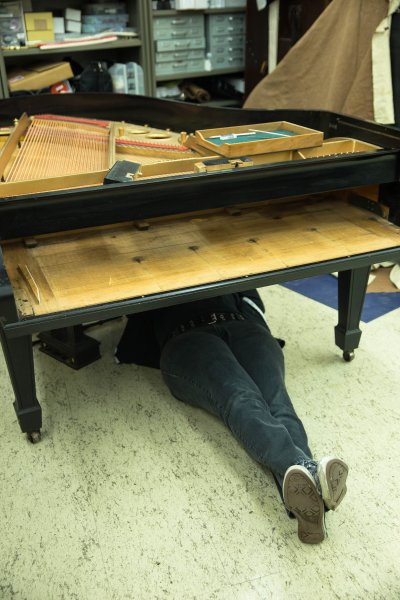Michelle Stranges keeps Western's 85 pianos in tune
From a young age, many children dream of what they want to be when they grow up. While some hope to become firefighters or teachers, Western’s Michelle Stranges knew from a young age that she was meant to be a piano tuner.
Forty years later, Stranges is Western’s first full-time piano technician, caring for each and every one of the university’s 85 pianos and four harpsichords.
“I’m an ambassador for the instruments, even a doctor, so to speak,” Stranges said. “I maintain their health and fix them when they’re broken.”
Stranges’ schedule is just about as unconventional as the job itself. While she works around 40 hours a week, her hours are largely dependent on performance schedules. She can often be found tinkering with instruments late at night, the only time that the performance spaces are not occupied by students.
As a piano technician, Stranges feels a responsibility to pianists to provide them with the best possible instrument.
“Pianists need technicians, and we need pianists,” Stranges explains. “We have to make sure that we can give them an instrument that allows them to think of just the music aspect of performing; we take care of the rest.”
Rachel Roulet, head staff accompanist for Western’s College of Fine & Performing Arts, can attest to the mutual relationship between technicians and pianists. Roulet has always appreciated Stranges’ diligence when it comes to student and staff repair needs.
“Whenever I perform with a piano Michelle has worked on, she always asks me, ‘how did your performance go’ in the days following,” Roulet said. “I’ll mention even the slightest flaw in the instrument, and next thing I know, she’s fixed it. She absolutely adores her job, and she’s great at it, too.”
Stranges understands the challenges of piano performance better than most, having taken piano lessons throughout her childhood, starting at 5 years old.
“I was just terrible at piano,” Stranges said with a laugh. “I hated it. I got extremely nervous when I had to play in front of anyone.”
Shortly after beginning lessons, Stranges’ parents bought her a small upright piano for her to practice on and hired a professional piano tuner for maintenance.
Her parents found the best tuner in the area, a man with visual impairments. From the first time Stranges met the tuner, she was mesmerized by his work.
“To me, this guy knew a big secret no one else knew,” Stranges said. “I thought he had each note memorized. His blindness did not hinder him, he was humble and his work was important to music making.”
Stranges would often pester the tuner as he worked on her piano, wanting to see and understand the tuning process. In fact, Stranges enjoyed watching him work so much that she would often make excuses that her piano was out of tune, just so he would come over.
In high school, Stranges came to the conclusion that performance was not for her. While she briefly considered becoming a recording engineer, she was told that math skills were important to the job, which deterred her.
Stranges knew that she wanted to work with her ears and her hands, which eventually led her to pursue her love of tuning. She attended the piano technician program at the North Bennet Street School in Boston, one of the only programs of its kind in the country.
Sitting in the audience and knowing that you played an important role in preparing the instrument for that performance, that’s a really cool moment.
For years, Stranges traveled throughout the East Coast, serving as a piano technician at different institutions and universities. She has always been dedicated to her craft; it is not unusual for her to see a small issue with a piano in a hotel lobby or museum and fix it.
Stranges always hoped to retire in the Seattle area, as she prefers West Coast weather. On one fateful day 3 ½ years ago, Stranges saw a job posting for a full-time piano tuner at Western and knew she had to apply. She was offered the position, packed up her life and moved across the country. She has been in Bellingham ever since, and says she never plans to leave.
“The faculty and the staff at Western all have such interesting backgrounds,” Stranges said. “They’ve all worked so hard to get where they are. They’re all very professional, but also so cool.”
When asked what the best part of her job is, Stranges has a hard time narrowing down just one answer. One of the most rewarding moments, she says, is listening to a performance on an instrument she’s tuned.
“Sitting in the audience and knowing that you played an important role in preparing the instrument for that performance, that’s a really cool moment,” Stranges said. “That’s a big part of why I do what I do.”
